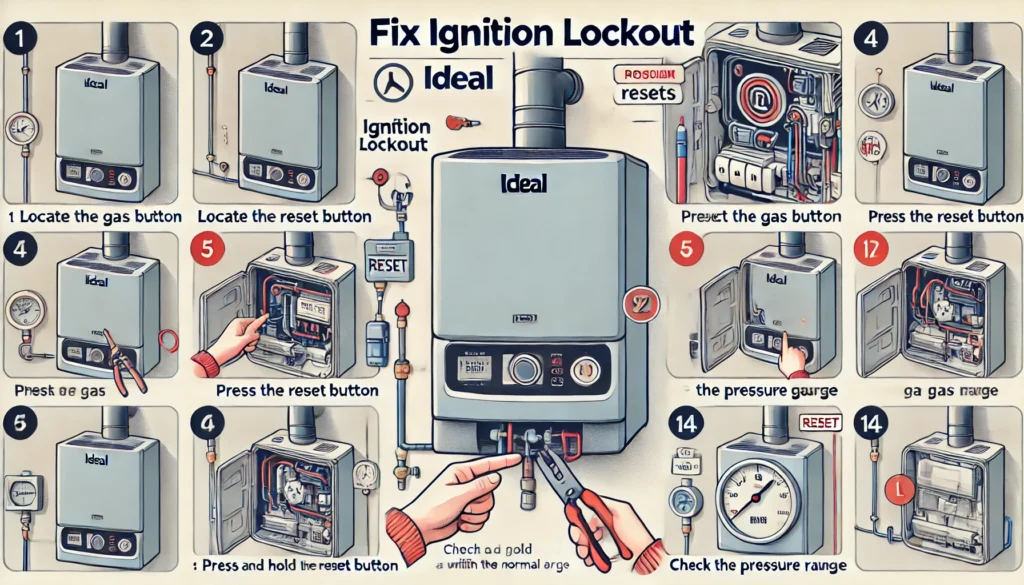Introduction
Ignition Lockout: One of the most common problems that affect ideal boilers is an ignition lockout, which will cause your boiler to shut down and stop heating or providing hot water. When the boiler detects an issue, it activates a safety feature that prevents any additional damage or dangerous situations. There are many reasons why an ignition lockout would occur, whether it be because the flue is blocked, due to lack of gas flow, or because other components may have failed.
There may even be a power failure. That’s why knowing how to troubleshoot and correct a boiler ignition lockout can keep your system running as smoothly and safely as possible, giving you a heating or hot water supply that is not only reliable but also fully operational.
In this blog, we will explain the steps to diagnose and repair the ignition lockout on an Ideal Boiler. Follow this guide to help ensure you address these issues and save your wallet from an expensive repair bill. Nonetheless, always remember that boilers are dangerous if you do not know what you are doing, so always seek help from professionals when necessary.
Also Check: – Boiler Repairs In London
What is Ignition Lockout?
One of these safety features that is installed in most gas boilers, including Ideal Boilers, is Ignition lockout. This feature stops the boiler from working if there is to be a fault. The boiler is placed in lockout mode when it encounters a problem, which, if left unchecked, may lead to dangerous situations such as non-ignition. This mitigates any additional injury and limits hazards such as gas leaks or other serious scenarios.
Ignition Lockout on Ideal Boilers – The Common Causes
Blocked Flue or Ventilation Problems: A blocked flue stops dangerous gases from being expelled into the open; a lockout is actioned to prevent carbon monoxide buildup.
Gas Supply Problem: Problems with the gas supply, such as a closed valve or low pressure in the boiler’s line, make it impossible for your device to ignite.
Defective Ignition Electrodes or Flame Sensors: These are critical components that monitor the flame. However, if they are dirty, damaged, or not working properly, then the boiler may either not ignite or keep lit.
Boilers: There may be low water pressure or problems with the pump; boilers need to have specific water pressure in order to work correctly. If the pressure is too low, or if there are problems with your water pump, you may find that the boiler locks out to prevent overheating and damage.
Electrical Faults or Control Board Failure: Loose wires or a faulty control board can interrupt the boiler’s ignition method, leading to lockout.
Cut the Power Supply: Only inspect or search for repairs by cutting off the power supply to your boiler, said a repairer from Whippet Heating. This can save the boiler from short circuits and damage.
It is important to have a Gas Safe registered engineer on hand in case you suspect any gas leak or are unsure of the repair. Only try to fix gas appliances on your own if you are authorized to do so.
Also Check: – New Boiler Installation in London
Necessary Tools and Supplies
Starting the Troubleshooting Process Here are some of the tools and materials you need before following any troubleshooting:
- Screwdriver (for removing boiler panels)
- Multimeter (to check electrical work)
- If your boiler is an Ideal, you can find the ideal manual here.
- Cloth or brush (for cleaning)
- Spare parts (e.g., electrodes or sensors)
How to Correct the Lockout of Your Ignition (Step-by-Step)
Step 1: Reset the Boiler
The first method on how to clear an ignition lockout is to troubleshoot the boiler by resetting it:
- Find the Reset Button: The boiler’s reset button is usually on its control panel. If you need help determining where yours is, refer to your boiler’s manual.
- Hold Reset Button: This involves holding the button for 5 to 10 seconds after following your router menu. The boiler will make a further effort to light.
- Listen for the Boiler to Ignite Upon Reset: Allow several minutes after you reset it to listen to see if your boiler attempts to ignite. If the boiler still locks out, move to the following steps.
Step 2: Check for Error Codes
With the Ideal boilers in lockout mode, an error code normally presents itself on the control panel.
- Error Code Check: The most common thing written in the display panel is an error code, which you need to check.
- Reference the Boiler Manual: The manual will help you decipher what your error code means.
- Error Code: Know the code you are receiving so that you can pinpoint what is actually happening.
Step 3: Check the Gas Supply
Having a reliable gas supply is just as important for boiler functioning:
- Check the Gas Supply: Ensure that you have opened up all of the gas valves leading to your boiler.
- Check for Gas Leaks: Turn off gas flow and ventilate the room if you smell or suspect there may be a leak of natural gas. Do not try to light any flame or run any electrical appliances. Contact a Gas-safe engineer.
Step 4: Investigate the Flame Sensor and Ignition Electrode
These can cause repeated ignition lockouts:
- Access the Components: Take off the front panel of your boiler so you can get to the ignition electrodes and flame sensors.
- Check for Wear, Corrosion, or Dirt: Inspect visually for signs of wear, corrosion, and dirt. If your electrodes are dirty, clean them with a cloth and replace them if they’ve been damaged.
- After cleaning or replacing parts, reassemble the boiler and try to reset it again.
Step 5: Verify Water Pressure
Incomplete boiler operation due to low water pressure:
- Water Pressure Gauge: Should be set between 1 to 1.5 bar when at room temperature.
- Re-Pressurize Boiler: To do this, use the filling loop and cold water, and add water until it has come to the appropriate pressure.
Step 6: Clean or Replace Blocked Flues/Ventilation
The boiler may block flues and cause a serious safety risk.
- Inspect Flue Pipe: Look up the flue and check for any visible blockages.
- Professional cleaning of flues is recommended. If the flue gets severely blocked or damaged, you should call in a professional to replace it.
Step 7: Electrical Checks
Problems with ignition from electrical faults:
- Check for Loose Wires: Open the boiler case and physically look at some of the internal wiring.
- Multimeter: Test for continuity of the wires. Repair or replace any broken circuits and damaged wiring.
Step 8: Call a Professional
Most ignition lockout problems can be resolved by simple troubleshooting, but some may need professional intervention:
- Persistent or Uncertain Faults: If you are unable to diagnose the fault or it locks out after two resets, get in touch with a professional.
- For Anything More Complicated: Problems with gas valves, control boards, or major components should always be dealt with by a professional engineer.
- Maintain your boiler: Book an annual service with a registered engineer to avoid potential problems and guarantee the proper functioning of your appliance.
How to Choose a Heating Engineer
Find local Gas Safe registered engineers. Read reviews and ask for recommendations to make sure you hire a reputable professional.
- Maintenance: Get your boiler serviced every year by a Gas Safe engineer to keep it running well and safely.
- Performance of Boiler: Be sure to monitor the performance of the boiler and, if any minor issue arises, address it before it becomes a major problem.
- Unclog Vents and Flues: Inspect vents and the flue system regularly to see if there is an obstruction.
Conclusion
Ideal boiler ignition lockouts can be annoying, but most problems have simple solutions if you know what to look for. If you know what causes ignition lockouts in the first place and follow this handy mechanic guide, then you, too, can fix most of them on your own! However, remember safety always comes first, so if in doubt, call a professional!
If you are faced with persistent problems or want to avoid any repairs, give your local heating engineer a call. This way, you can prevent possible future lockouts, and your boiler will function properly as a source of heat and hot water.

Sunny Saini is a certified heating engineer with over 15 years of experience in maintaining and repairing boilers. He specializes in diagnosing complex boiler issues and providing reliable solutions to ensure homeowners stay warm and comfortable throughout the year.





![]=](https://localboiler.co.uk/wp-content/uploads/2024/05/Untitled-design-96-300x300.jpg)